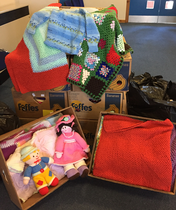Care for Creation
|
|
|
ECO CONGREGATION
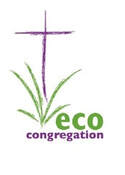
Many Christians are concerned about the environment but don’t know what they can do. Eco-Congregation Scotland is an ecumenical programme to help congregations understand environmental issues and make appropriate practical and spiritual responses.
To find out more about Eco Congregation Scotland visit: www.ecocongregation.org/scotland

In 2008, we were awarded our Eco Congregation Status. We were commended for our recycling programme, our linking of environmental issues and our Christian faith and taking action in the local or global community. Two years on and we were awarded our second award. We became more involved in worship, recycling, calculating and reducing our carbon footprints, enhancing the grounds of our church buildings, supporting Third World Issues and many other activities. Now we have gained our Third Award.
We continue to support existing projects and we try to introduce new ideas and initiatives whenever possible. We continue our recycling project with many items being collected at both churches. The following can be recycled - ink cartridges, aluminium foil, milk bottle tops, used postage stamps, foreign coins and mobile phones. The proceeds from the sale of the ink cartridges goes directly to Christian Aid and the proceeds from selling the foil is used to help enhance the grounds around the buildings.
We continue to support existing projects and we try to introduce new ideas and initiatives whenever possible. We continue our recycling project with many items being collected at both churches. The following can be recycled - ink cartridges, aluminium foil, milk bottle tops, used postage stamps, foreign coins and mobile phones. The proceeds from the sale of the ink cartridges goes directly to Christian Aid and the proceeds from selling the foil is used to help enhance the grounds around the buildings.
Soft Plastics
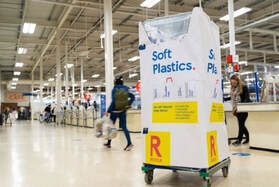
SOFT PLASTICS RECYCLING
But what are soft plastics?
Soft plastics are lightweight plastics that often cannot be placed in recycling bins at home. Think plastic film lids on yoghurt pots, soft fruit punnets and ready meals, as well as plastic crisp packets, pasta bags and chocolate or biscuit wrappers and a lot more.
What the are not, are plastic bottles, tubs, pots, trays and caps. If you’re not sure, a simple test is to scrunch it up and if it pings back, it’s a useful indicator it's soft plastic.
Soft plastic shouldn’t go in your kerbside recycling bin and neither should they go in the general bin to end up in landfill. These can all be collected at home and disposed of in the bins provided at participating supermarkets. Our Local Tesco supermarket has one of these in store. Have you spotted it yet?
Defra published recently that less than half (47.3%) of plastic packaging waste was recycled in 2020.Now that’s a big problem for the planet. Because the remaining 52.7% gets burned in incinerators or dumped, either in landfill or in the environment, where it leaches hazardous chemicals into the environment. Or it gets blown into the oceans, where at least eight million tonnes of plastic end up each year, according to the International Union for Conservation of Nature. Otherwise it gets sent abroad, where Greenpeace has warned the “dumping and burning” of plastic waste “poses a serious threat to people’s health”.
One tip I got from a friend might help you on your way with this. Keep an empty bread bag under the sink. Everytime you have piece of soft plastic, make sure it is clean and pop into the bread bag. Keep pushing the plastic down and when the bag is really full, tie the top and you are ready to take it with you the next time you go shopping at the supermarket. I am amazed how much can be crammed into a bread bag! I am also amazed at how little is now in my general kerbside bin.
God commanded us to be stewards of the planet. Let’s make an effort to do this and hand on God’s amazing creation in a state that is fit for purpose! We can all play our part so start NOW and get that soft plastic recycled.
Below you can find a more comprehensive list of what can be recycled under the soft plastics heading at major supermarkets
But what are soft plastics?
Soft plastics are lightweight plastics that often cannot be placed in recycling bins at home. Think plastic film lids on yoghurt pots, soft fruit punnets and ready meals, as well as plastic crisp packets, pasta bags and chocolate or biscuit wrappers and a lot more.
What the are not, are plastic bottles, tubs, pots, trays and caps. If you’re not sure, a simple test is to scrunch it up and if it pings back, it’s a useful indicator it's soft plastic.
Soft plastic shouldn’t go in your kerbside recycling bin and neither should they go in the general bin to end up in landfill. These can all be collected at home and disposed of in the bins provided at participating supermarkets. Our Local Tesco supermarket has one of these in store. Have you spotted it yet?
Defra published recently that less than half (47.3%) of plastic packaging waste was recycled in 2020.Now that’s a big problem for the planet. Because the remaining 52.7% gets burned in incinerators or dumped, either in landfill or in the environment, where it leaches hazardous chemicals into the environment. Or it gets blown into the oceans, where at least eight million tonnes of plastic end up each year, according to the International Union for Conservation of Nature. Otherwise it gets sent abroad, where Greenpeace has warned the “dumping and burning” of plastic waste “poses a serious threat to people’s health”.
One tip I got from a friend might help you on your way with this. Keep an empty bread bag under the sink. Everytime you have piece of soft plastic, make sure it is clean and pop into the bread bag. Keep pushing the plastic down and when the bag is really full, tie the top and you are ready to take it with you the next time you go shopping at the supermarket. I am amazed how much can be crammed into a bread bag! I am also amazed at how little is now in my general kerbside bin.
God commanded us to be stewards of the planet. Let’s make an effort to do this and hand on God’s amazing creation in a state that is fit for purpose! We can all play our part so start NOW and get that soft plastic recycled.
Below you can find a more comprehensive list of what can be recycled under the soft plastics heading at major supermarkets
- All plastic bags, except biodegradable or compostable bags
- Bread bags
- Breakfast cereal liners
- Bubble wrap
- Delivery bags
- Dry cleaning bags
- Frozen food bags
- Magazine and newspaper wrappers
- Multi-pack wrapping
- Plastic marked as low-density polyethylene (LDPE) - resin ID code 4
- Toilet roll wrapping
- Baby, pet food, detergent and cleaning pouches
- Biscuits and chocolate wrapping
- Cheese, fish and meat wrapping
- Cling film
- Crisp and sweet bags
- Plastic film lids
- Salad, pasta, and rice bags
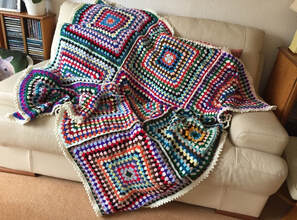
Knitting for Malawi
This was a spin off from one of the Eco Projects. Twice a year we have Knitting Collection months, in March and September. Members of the congregation, the community and beyond produce wonderful knitted items which are packaged up and sent out to Malawi through our local Presbytery and through the Dalitso project based in Arbroath. We are so grateful for the fantastic response that we have had to this project over the years. Jumpers, cardigans, socks, hats for babies and young children are most welcome as are blankets that families can use for the cold nights. These need to be quite big so if you can only manage a small blanket, don’t put a pretty border round it and someone else will sew several together and then add a border to make a family sized blanket.
This was a spin off from one of the Eco Projects. Twice a year we have Knitting Collection months, in March and September. Members of the congregation, the community and beyond produce wonderful knitted items which are packaged up and sent out to Malawi through our local Presbytery and through the Dalitso project based in Arbroath. We are so grateful for the fantastic response that we have had to this project over the years. Jumpers, cardigans, socks, hats for babies and young children are most welcome as are blankets that families can use for the cold nights. These need to be quite big so if you can only manage a small blanket, don’t put a pretty border round it and someone else will sew several together and then add a border to make a family sized blanket.
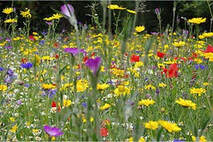
Trinity Garden
We have a new gardener at Trinity. Calum is keen to embrace our Eco Congregation status and is going to change small grassy areas at the back of Trinity Church into ‘wild’ areas. This means you will see longer grass! It’s not just uncut! We hope that in time you will see a variety of wild flowers popping up and hopefully encouraging more bees and insects in our environment.
We have a new gardener at Trinity. Calum is keen to embrace our Eco Congregation status and is going to change small grassy areas at the back of Trinity Church into ‘wild’ areas. This means you will see longer grass! It’s not just uncut! We hope that in time you will see a variety of wild flowers popping up and hopefully encouraging more bees and insects in our environment.
